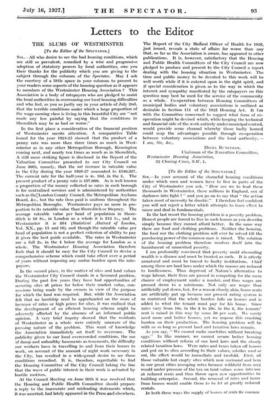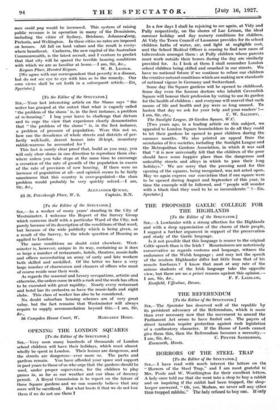[To the Editor of the SPECTATOR.] SIR,—In your account of
the shameful housing conditions under which men and women have to live in parts of the City of Westminster you ask, How are we to lead these thousands in Westminster, these millions in England, out of darkness into light ? " and you go on to say that " the action taken must of necessity be drastic." I therefore feel confident you will not reject a letter which attempts to trace effect to cause and deal in fundamentals.
In the last resort the housing problem is a poverty problem. Honest people are forced to live in such houses as you describe simply because they cannot afford better. In the same way there are food and clothing problems. Neither the housing, the food nor the clothing problem will ever be solved till the purchasing power of the common man is raised. The solution of the housing problem therefore resolves itself into the banishment of unmerited poverty.
I am profoundly convinced that poverty amid abounding wealth is a disease and must be treated as such. It is utterly unnatural and must be traced to faulty institutions. Chief among these are land laws under which the masses are reduced to landlessness. Thus deprived of Nature's alternative to wage labour, their lives are passed in competing for the mere chance of employment under a master, and thus wages are pressed down to a minimum. Not only are wages thus artificially put down, but, for a reason closely akin, house rents are artificially put up because our present rating system is so contrived that the whole burden falls on houses and is added to what the tenant must pay for his home. Since rates vary from 105. in the £ to 20s. in the £, the tenants' rent is raised in this way by some 50 per cent. I'Ve sorely need more and better houses, yet we impose this crushing burden on their production. The housing problem will be with us so long as present land and taxation laws remain.
As you say, " We cannot make omelettes without breaking
eggs." In like manner, we cannot secure better housing conditions without reform of our land laws and the closely related taxation laws. Were rates and taxes taken off houses and put on to sites according to their values, whether used or not, the effect would be immediate and twofold. First, all those valuable but empty sites which now surround and hem in our great cities (escaping rates because withheld from use) would under pressure of the tax on land values come into use at reduced rents and thus throw open new opportunities to building enterprise. Second, the removal of rates and taxes from houses would enable them to be let at greatly reduced rentals.
In both these ways the supply of houses at rents the common man could pay would be increased. This system of raising public revenue is in operation in many of the Dominions, including the cities of Sydney, Brisbane, Johannesburg, Pretoria, and Wellington. In these cities no rates are imposed on houses. All fall on land values and the result is every- where beneficent. Canberra, the new capital of the Australian Commonwealth, is the latest recruit, and I venture to predict that that city will be spared the terrible housing conditions with which we are so familiar at home.—I am, Sir, &c., [We agree with our correspondent that poverty is a disease, but do not see eye to eye with him as to the remedy. Our own views shall be set forth in a subsequent article.—En, Spectator.]











































 Previous page
Previous page